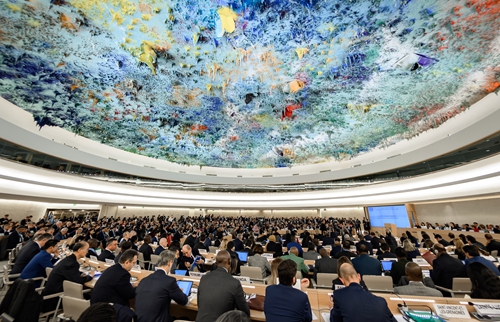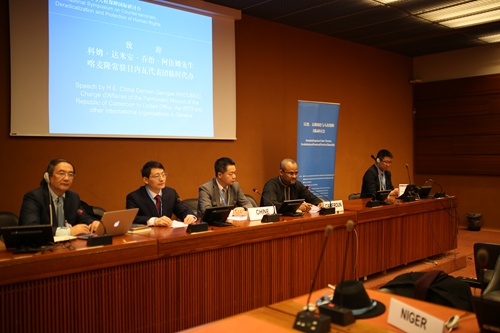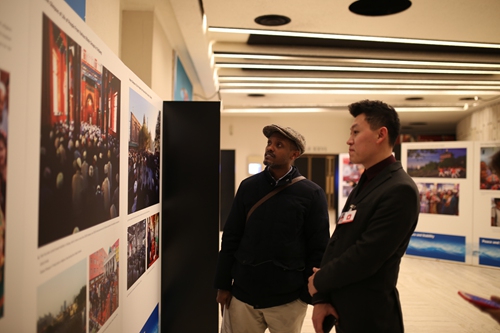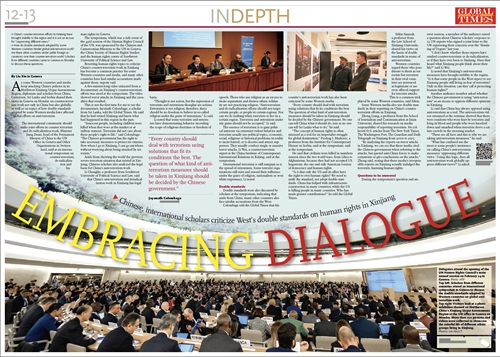Misusing human rights issues shows West's double standards on anti-terrorism: scholars
○ China's counter-terrorism efforts in Xinjiang have brought stability to the region and it is not an excuse for "oppressing different views."
○ How do double standards adopted by some Western countries hinder global anti-terrorism work? Are there other countries under unfair foreign accusations over their counter-terrorism work? Scholars from different countries came to Geneva on Monday to discuss these questions.

Delegates attend the opening of the UN Human Rights Council's main annual session on February 24 in Geneva. Photo: AFP
As some Western countries and media keep attacking China's policies in its Northwest Xinjiang Uygur Autonomous Region, diplomats and scholars from China, Cameroon, Sri Lanka and Serbia shared their views in Geneva on Monday on counter-terrorism work not only in China but also globally, as well as on topics of how double standards adopted by some Western media have affected global efforts on anti-terrorism.
The international community should make joint efforts in counter terrorism and de-radicalization work, Minister Jiang Duan, head of the Permanent Mission of China to the UN Office in Geneva and Other Organizations in Switzerland, said at an international symposium on counter-terrorism, de-radicalization and human rights in Geneva.
The symposium, which was a side event of the 43rd session of the Human Rights Council of the UN, was sponsored by the Chinese and Cameroonian Missions to the UN in Geneva, the China Society of Human Rights Studies and the human rights center of Southwest University of Political Science and Law.
Resorting human rights topics to criticize China's counter-terrorism work in Xinjiang has become a common practice for some Western countries and media, and many other countries have had similar accusations made against them, experts said.
A five-minute-long video extracted from a documentary on Xinjiang's counter-terrorism efforts was aired at the symposium. The video showed terror attacks in Xinjiang and the casualties that resulted.
This is not the first time for me to see the documentary, Jayanath Colombage, a scholar from Sri Lanka, told the Global Times. He said that he had visited Xinjiang and knew what had happened in this region in the past.
"Innocent people, including children were killed when they were at the market or at railway stations. Terrorists did not care about these people's right to life," said Colombage. "The Chinese government has the right to take necessary measures to protect its citizens. Now when I go to Xinjiang, I can go anywhere without worrying about being attacked by terrorists."
Aside from showing the world the previous severe terrorism situation that existed in Xinjiang, Chinese scholars also analyzed the legal basis for China's anti-terrorism work.
Li Changlin, a professor from Southwest University of Political Science and Law, said that China's anti-terrorism and deradicalization work in Xinjiang has legal basis.
"Thought is not action, but the expression of terrorism and extremism thoughts are actions. Extremism is not religion; therefore, there should be no freedom to believe in so-called religion under the guise of extremism," Li said.

Scholars from different countries attend an international symposium in Geneva to discuss the double standards adopted by Western countries on global anti-terrorism work.. Photo: Liu Xin/GT
Li noted that some terrorists and extremists have demonstrating behavior exceeding the scope of religious doctrines or freedom of speech. Those who use religion as an excuse to incite separatism and destroy ethnic solidarity are not practicing religion. "Anti-terrorism and de-radicalization efforts should not target certain people, or people in certain regions. Nor can we do nothing when terrorists or live in a certain region. Terrorism and extremism under any guise should not be accepted," Li said.
The essence of terrorism is to gain political interests via extremist violent behavior and terrorists usually use political topics, economic, social, religious or historical problems in reality to incite hatred, or to deceive and attract supporters. They usually conduct single or massive terror attacks, Li Wei, a counter-terrorism expert at the China Institute of Contemporary International Relations in Beijing, said at the symposium.
International terrorism is still rampant as is the spread of extremism. Some terrorist organizations still exist and extend their influence under the guise of religion, nationalism or even white supremacy, Li noted.
Double standards
Double standards were also discussed by scholars at the symposium, indicating that aside from China, many other countries also face similar accusations from the West.
Colombage told the Global Times that his country's anti-terrorism work has also been criticized by some Western media.
"Every country should deal with terrorism using solutions that fit its conditions the best. The question of what kind of anti-terrorism measures should be taken in Xinjiang should be decided by the Chinese government. No one can tell China what it should do, just as no one can tell Sri Lanka what to do," he said.
"The concept of human rights is often misused as a tool for an imperialist struggle for global domination," Predrag J. Markovic, a professor from the Institute for Contemporary History in Serbia, said at the symposium. said at the symposium.
He said that civilians were killed in numbers unseen since the two world wars, from Libya to Afghanistan, because they had not accepted US hegemony. the one and only American version of democracy and human rights.
"Is it that only the US and its allies have the right to own human rights? We need to unify the standard, not adopt double standards. China has helped with infrastructure construction in many countries, while the US is killing people in many countries. Who has made greater contributions?" he told the Global Times.
Erkin Samsak, a professor from the Law School of Xinjiang University, shared his views on the harm of double standards in terms of anti-terrorism.
Western countries regard those who pose threats to them as terrorists but terrorists in their rival countries are portrayed as legitimate or are even offered support for terrorist attacks. This is a common trick played by some Western countries, said Erkin.
Some Western media also use double standards in their reporting on China's counter-terrorism efforts in Xinjiang.

Visitors look at a photo exhibition themed on Northwest China's Xinjiang Uygur Autonomous Region at the UN office in Geneva on Monday. More than 100 pictures and videos were collected to showcase the colorful life of different ethnic groups living in Xinjiang. Photo: Liu Xin/GT
Zheng Liang, a professor from the School of Journalism and Communication at Jinan University, shared his research on media responsibility of reporting terrorism. He collected 676 articles from The New York Times, The Washington Post, The Guardian and Daily Telegraph on Xinjiang from 2000 to 2015.
"By analyzing the reports on terror attacks in Xinjiang, we can see that these media cited the Chinese government when referring to the attacks, but quoted anti-China forces to make comments or give conclusions on the attacks," Zheng said, noting that these media's irresponsible reports on Xinjiang actually indulged the terrorists, harming human rights.
Questions to be answered
During the symposium's question and answer session, a member of the audience raised a question about Chinese scholars' response to 12 UN experts who signed a joint letter to the UN expressing their concerns over the "detaining of Uygurs" last year.
"I don't know whether those experts have studied counter-terrorism or de-radicalization, or if they have ever been to Xinjiang. Have they heard what Xinjiang people think about their life?" said Li Wei.
Li noted that Xinjiang's anti-terrorism measures have brought stability to the region. "Is it that some people in the West expect to see Xinjiang people still living in fear of terrorism? Only in this situation, can they call it protecting human rights?"
Another audience member asked whether the Chinese government is using "anti-terrorism" as an excuse to oppress different opinions in Xinjiang.
Li said that China has always opposed using anti-terrorism as a tool. The anti-terrorism videos streamed at the seminar showed that there were residents who were hurt by terrorists and lying in blood and people who were knocked down and smashed when terrorists drove a car into crowds in the morning market.
"These are all facts and this is why we are taking anti-terrorism measures," he said.
"What has confused me the most is some people's insistence on calling China's anti-terrorism measures 'oppressing different views.' Using this logic, does all anti-terrorism work globally oppress different views?" Li asked.

GT
Newspaper headline: Voices against bias